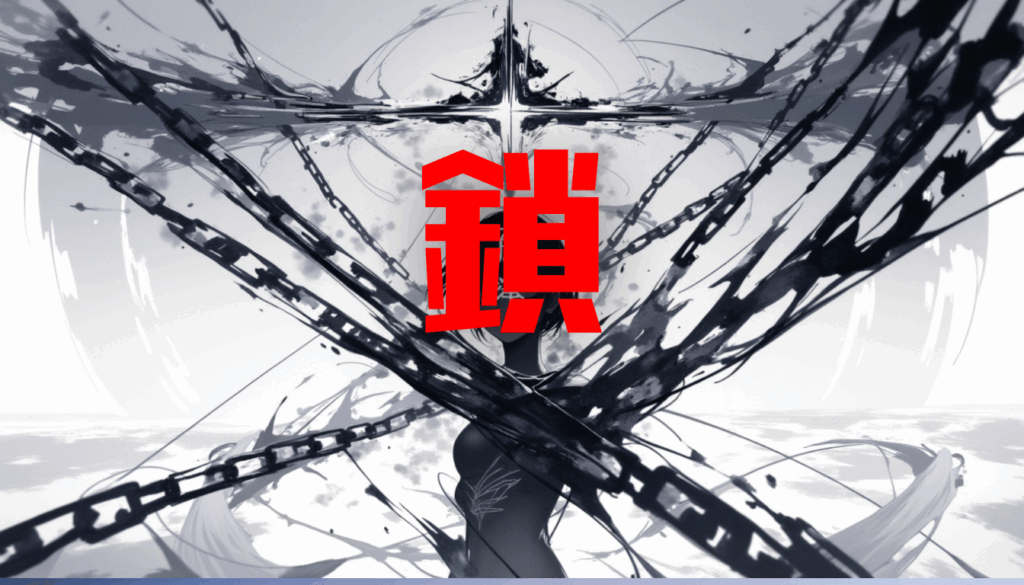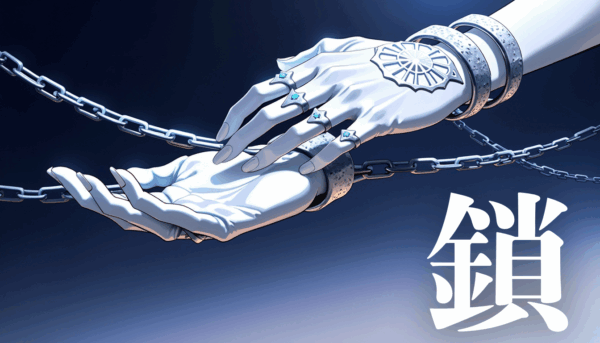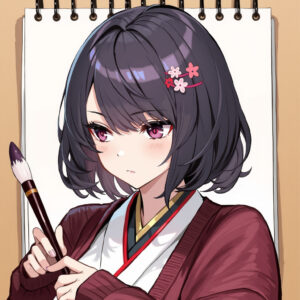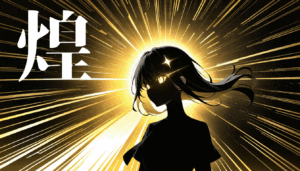Q. What is the Japanese kanji for “chain,” and what does it symbolize?
→ A. The kanji for “chain” is 「鎖」 (kusari). It means both physical chains and emotional ties in Japanese. It symbolizes restriction, connection, and even silent protection. This article explores its deeper meaning and cultural impact.
Have you ever felt like something invisible was holding you back?
Not in a loud or painful way —
but like a quiet weight wrapped around your chest.
A pressure you can’t quite explain.
In Japanese, there’s a single kanji that captures this feeling perfectly:
「鎖」 – kusari.
It means “chain.”
But not just the kind made of iron.
This kanji holds the idea of being bound,
protected,
or even connected — all at once.
Some chains are heavy.
Others are beautiful.
And sometimes… they’re both.
Today, let’s explore 「鎖」 as more than just a word —
but as a symbol of the struggles we carry,
and the strength it takes to live with them.
Kanji for Chain – What is 「鎖」?
The Japanese kanji for “chain” is 「鎖」, read as kusari.
It combines two parts:
- 金 (metal) on the left
- a component that means “close” or “lock” on the right
Put together, they create a character that’s both physical and symbolic —
a tool made of metal, used to bind, protect, or block.
In everyday Japanese, you’ll find it in words like:
- 鎖国(さこく) – national isolation
- 封鎖(ふうさ) – blockade
- 鎖骨(さこつ) – collarbone (“the chain bone”)
But beyond those definitions, 「鎖」 carries something deeper.
A feeling of being held — not just physically,
but emotionally.
Something that ties, confines, or connects — often silently.
The symbolism of 「鎖」 – More than just bondage
Chains are often seen as a symbol of restriction.
They bind. They trap.
They keep people from moving freely.
But in Japanese culture, 「鎖」 holds more than just this heavy meaning.
It can also suggest:
- Protection — like armor, shielding someone from harm
- Loyalty — a chosen bond, like staying with someone out of love
- Fate — an invisible thread that pulls two people together, for better or worse
Sometimes, we are held not by force,
but by connection — a promise, a memory, or even a quiet hope.
In Western symbolism, chains are often associated with oppression, slavery, or punishment.
They represent something negative —
a force that takes away freedom, often against one’s will.
But in Japanese culture, while chains can also imply restriction,
they sometimes carry a sense of chosen connection.
Think of a samurai’s loyalty.
A child’s bond to family.
Or even the silent promise to stay by someone’s side — no matter the weight.
Where Western chains scream “break free,”
Japanese chains sometimes whisper,
“I’ll stay, even if it hurts.”
This subtle contrast makes 「鎖」 not just a translation,
but a cultural expression of how we endure and love differently.
「鎖」 expresses this duality.
It reminds us that chains aren’t always negative.
They can be the very thing that keeps us grounded,
or holds our heart together when we feel like falling apart.
Why choose 「鎖」 for tattoo or design?
At first glance, 「鎖」 may seem like a harsh kanji —
all sharp lines and heavy energy.
But that’s exactly what draws people to it.
It feels strong,
honest,
and unapologetically real.
People choose 「鎖」 as a tattoo or design element for many reasons:
- To represent struggles they’ve survived
- To show emotional boundaries they carry
- To symbolize a deep, unbreakable bond
The metal radical gives it a grounded, industrial beauty,
while the complex form reflects the layered nature of pain and resilience.
And when written in calligraphy or ink?
「鎖」 has a fierce elegance — like armor turned into art.
For some, it’s not just about looking cool.
It’s about wearing their truth.
「鎖」 as an emotional kanji
Some feelings are hard to say out loud.
Like when you feel stuck in a place you can’t leave —
or bound to someone or something you can’t explain.
That’s where 「鎖」 lives.
Not in noise, but in silence.
Not in chaos, but in the weight you carry quietly.
People use this kanji to express:
- Emotional exhaustion
- Unspoken trauma
- The quiet kind of love that never lets go
It’s a wordless way to say:
“I’ve been through things. And I’m still holding on.”
Unlike dramatic symbols like “fire” or “death,”
「鎖」 speaks to those who feel everything…
but keep it all locked inside.
Sometimes, we carry pain we can’t name.
Not because we’re hiding it —
but because it’s become part of who we are.
For people like that, 「鎖」 feels honest.
It doesn’t dramatize your experience.
It just stands there, firm and quiet — like you do.
It’s the kanji for people who don’t need to scream to be strong.
Who endure not to impress, but to survive.
And sometimes, to protect others from their own pain.
「鎖」 is that kind of quiet recognition.
A symbol that sees you,
even when no one else does.
In that sense, 「鎖」 isn’t a weakness.
It’s a reminder of the strength it takes
to carry your story without shouting it.
Summary – 「鎖」 and the weight we carry

Chains are heavy —
but sometimes, so are the things we don’t talk about.
The kanji 「鎖」 reminds us of that quiet truth.
It speaks to the parts of us that feel bound,
but not broken.
Held, but not trapped.
It’s the weight of a promise.
The echo of a past.
The outline of something we’ve chosen to carry — even when no one sees it.
「鎖」 is not about escape.
It’s about endurance.
And the silent strength it takes
to keep living with what still holds you.
If this kanji resonates with you…
maybe it’s already a part of your story.
Related kanji you might love
If 「鎖」 spoke to something inside you,
you might feel the same connection with these kanji too:
🔗 繋(つなぐ / Connect)
A symbol of connection and continuity.
Where 「鎖」 speaks of holding, 「繋」 speaks of reaching.
🧶 絆(きずな / Bond)
This kanji means deep emotional ties.
It often appears in stories of family, friendship, and unbreakable relationships.
🌑 闇(やみ / Darkness)
The space where pain and silence live.
Perfect for those who embrace emotional depth without fear.
🚪 閉(とじる / Shut)
Not all closures are endings.
This kanji suggests boundaries — protective or isolating — that define your world.
🧭 More kanji, more emotion.
Explore the kanji that match your heart.
You can find more emotional characters in our Kanji Vibes series.



Comments